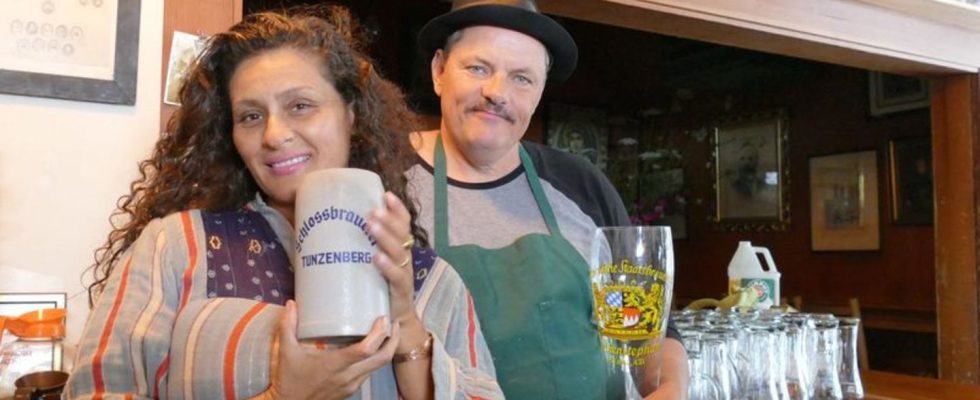San Francisco is known for its many cuisines and restaurants. Ironically, two Bavarians open a tavern there – that was 30 years ago. The “soup kitchen” is still a success story today.
Fabrizio Wiest, owner of the “Soup Kitchen” in San Francisco, lends a hand every day. Born in Bavaria, nicknamed Fabi and always wearing a hat, he swings his mop across the green floor. Then the 30-year-old wooden tables are polished with oil. “Everything should be spotless. Then there are flowers on it so that everything looks nice,” says the 59-year-old.
His “soup kitchen” has nothing in common with serving food for the needy. The popular restaurant in the west coast metropolis is a success story – for 30 years. Wiest, a graphic designer from Munich, and an acquaintance who was an enthusiastic hobby cook, dreamed of a German inn in California. “It was a crazy idea,” Wiest admits with a laugh. But the duo dared to take the step, of all places in a city that is hotly contested as a culinary hotspot.
At first it was only supposed to be “Soup and Salad”, but then it became the “Soup Kitchen” with Bavarian beer culture including a hearty menu, from schnitzel and sauerbraten to meat loaf and cheese spaetzle. In addition, there is the old flair of a Victorian house from the 19th century in what was then a slightly dingy district of Hayes Valley. The building appeared in a silent film from 1924, says Wiest.
success from the start
Inside whitewashed walls under a vaulted ceiling, outside yellow masonry with the name soup kitchen in the Bauhaus font and the founding year 1993 written in large letters on the house wall. “It was a great success right from the start,” says the Californian by choice. A young audience, artists and “an incredible number of bizarre” people came right away.
The area, close to the opera district, has long since become hip. But the cozy “soup kitchen” has hardly changed. Ancient stone jugs, originally from Bavaria, adorn the walls. In addition, framed historical portraits of the Bavarian King Ludwig II and the US President Abraham Lincoln. Wiest proudly points to an old engraving of Tunzenberg Castle near Dingolfing, where his grandfather used to brew beer.
Bavarian tradition is his mantra. With the long wooden tables where strangers sit together, they brought something completely new to San Francisco back then, emphasizes the innkeeper. Suddenly the most diverse people exchanged ideas instead of eating in isolation at their own table. Plus dozens of beers, all imported from Germany. For Wiest, the “soup kitchen” is the perfect advertisement for the local beer culture.
Big fuss in the small kitchen
Immediately after 5 p.m., when the heavy, old wooden doors are open, the guests start pouring in. “I’m a foodie and discovered the restaurant on a leaderboard,” says Juliana Cacciaroni on her first visit. “It’s cozy here, but not stuffy at all,” is her first impression. A waiter gives friendly assistance. His recommendation: Wiener Schnitzel, Jägerschnitzel or Sauerbraten.
In the small kitchen things are going around. Potato pancakes sizzle in the pan, schnitzel plates are garnished, the potato and cucumber salad is seasoned. Everything has to be “as traditional as possible,” says Wiest. “We make the meat loaf according to an old recipe from Lower Bavaria, and we get rolls from a baker here.”
But the chef is American. “Everyone likes sausage and potatoes,” grins Eric Fletcher. The fact that the “soup kitchen” has been around for 30 years is the best proof of quality. The most popular dish? Wiener Schnitzel, up to 40 orders in the evening. The most difficult dish? Pork. “I finally have that under control with Fabi’s help,” says Fletcher. “Tender on the inside but crispy on the outside, not too lean, not too fat, that’s a real challenge.”
Awarded a seal of approval
With a team of 30 people, Wiest runs the restaurant, now the sole owner, with a beer garden just around the corner. His wife, a Latina from Los Angeles, also helps out. The couple have three children. Her restaurant was recently recognized as a “Legacy Business” by the city council. “Simple German cuisine and great beer,” says the description. This seal of approval is awarded to companies that make a special contribution to San Francisco neighborhoods.
In a city with rapidly increasing prices and extremely high living costs, many businesses are struggling to survive. “It goes up and down in San Francisco, it’s been like this since the gold rush,” says Wiest. “Many become very rich, others go broke and then it starts all over again.” A currywurst in his beer garden costs 13 dollars (almost 12 euros), a Wiener schnitzel in the “soup kitchen” around 25 euros. In a city where a hamburger can cost $30, Wiest says his dishes are relatively affordable.
The soup kitchen success over three decades proves him right. And what is his favorite food in his adopted country? “Roast pork, meat loaf or knuckle of pork,” says the innkeeper without hesitation. “I love German food, but it’s way too underrated,” the Bavarian muses in German and English. That’s for sure – in the “soup kitchen” German food is not “underestimated”.

